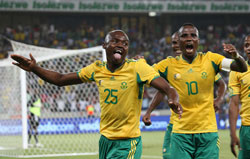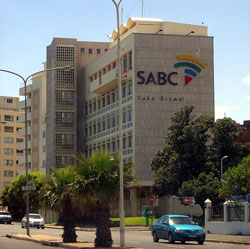
Related
Top stories





Energy & MiningGlencore's Astron Energy gears up with new tanker amidst Sars dispute
Wendell Roelf 12 hours

More news

















Logistics & Transport
Uganda plans new rail link to Tanzania for mineral export boost











It's been two weeks since S'bu Mseleku and I broke the South African Football Association's (Safa) R1bn broadcast-rights story and yet the hysteria still would not be out of place on the deck of a sinking ocean liner.
It seems that Safa's decision to sell the rights to Bafana Bafana matches to pay-television newcomer Siyaya TV has not gone down very well with some people and they've spent the past few days frothing at the mouth in frustration.
That reliable weapon of mass destruction - Twitter - is usually adept at measuring the emotional state of our fellow citizens and there were some who angrily accused Safa of greed for insisting on that kind of money.
They said the smell of the fistful of rands flashed by Siyaya TV was so intoxicating that Safa officials forgot that football is a sport of national interest and they tripped over themselves to link up with a pay channel.
Safa was also accused of displaying very little foresight for partnering with a new television station that does not even have a test signal, let alone a licence.
Those of us who like to put things into perspective haven't forgotten that the rights to rugby matches in this country also happen to be held by a pay-TV channel.
In fact, the SABC has not had a whiff of live Springbok matches since Louis Luyt signed a 10-year $550m deal with Rupert Murdoch's News Corp for the broadcasting rights to the Tri-Nations series between SA, New Zealand and Australia and the then Super 10 in 1995.
Oh, and before I forget, the SABC lost the broadcast rights to the Premier Soccer League (PSL) seven years ago and they've been held by SuperSport since 2007.
The skies did not fall on our heads when the PSL sold the rights to SuperSport International and, if anything, domestic football has benefited immensely after years of shabby treatment from the self-same SABC.
Sure, there are still some crucial questions about this whole deal that need answering and Siyaya TV will have an obligation to address them in the coming days.
We still do not know if they have the capacity to handle Bafana, Banyana Banyana, the Under-23 and other national teams as they have insisted behind closed doors.
But to suggest that Safa has committed some kind of criminal act after telling the SABC to find the lake closest to Auckland Park and jump into it is taking things too far.
The reality is the horse has bolted because the consortium has already paid R25m to Safa.
Siyaya secured free-to-air, pay-TV, mobile and internet rights to all South African national teams - men and women. It is a done deal and there is no going back.
The newcomers have elected to remain silent over the past few days and my sources tell me they will maintain the silence until they have been issued with a licence.
Independent Communications Authority of SA (Icasa) spokesman Paseka Maleka confirmed to Times Media that Siyaya was granted a licence in April. But he added the pay channel had to comply with the conditions set out by the regulator before it was issued the licence.
The regulator will issue the new licences towards the end of the month, and Siyaya expects to launch next June.
Lest we forget, the SABC had paid just R45m for Bafana matches over the past three years and it doesn't take a rocket scientist to figure out that this more than anything else motivated the move towards Siyaya TV.

Let's face it, most of the sporting codes around the world derive the majority of their income revenue from broadcasting and we can't begrudge Safa for looking for a way to finally compete with rugby and cricket, financially at least, on the same footing.
This is the same Safa that was R47m in the red only a year ago and has now projected a move back into the black when the final numbers are tallied by auditors for the year ended on 30 June. So just as I applauded the PSL when they made a business decision and sold their rights to SuperSport seven years ago, I will do the same for Safa for having the guts to make a tough call.
And while we're at it, have you noticed the deafening silence from the government since the news of Safa's R1bn deal with Siyaya TV broke?
I'm just saying, dear folks, I'm saying ...
Source: Business Day, via I-Net Bridge

For more than two decades, I-Net Bridge has been one of South Africa’s preferred electronic providers of innovative solutions, data of the highest calibre, reliable platforms and excellent supporting systems. Our products include workstations, web applications and data feeds packaged with in-depth news and powerful analytical tools empowering clients to make meaningful decisions.
We pride ourselves on our wide variety of in-house skills, encompassing multiple platforms and applications. These skills enable us to not only function as a first class facility, but also design, implement and support all our client needs at a level that confirms I-Net Bridge a leader in its field.
Go to: http://www.inet.co.za